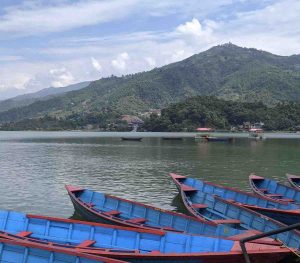There is hardly anyone who does not like travelling.
Some do it to explore new places, cities, and things, some do it for peace of mind, some do it because of their love for nature, some for the journey, and some for many other reasons.
Even though the joy of packing the bags and exploring a destination is different for each individual, travelling has changed a lot in recent years. From being a thing of privilege for people in the 80s and 90s, then an affordable and cool hobby for adults, to a full-time profession.
The Instagram reels of unexplored places, the Facebook posts on “N things to do in Place X”, and YouTube travel vlogs have also contributed to making travelling cool and trendy. Improvement in transport infrastructure and availability of hotels has further given impetus to the travel industry.
As per the World Travel & Tourism Council, the Travel & Tourism sector contributed 10.3% to the global GDP in 2019.

Every aspect of travel has so much significance now, and so does its impact on our Planet and the environment. The vulnerability of the environment is increasing day by day, and the effects of irresponsible travelling are contributing to that rate.
Many popular tourist destinations across the globe are struggling to keep pace with the increase in the number of travelers resulting in a negative impact on the environment and disturbing the authenticity of the destinations.
From plastic bottles lining up, the mountains and beaches to the mushrooming of hotels causing deforestation – the impact of the travel industry on the environment is being felt.
To respond to this crisis, sustainable tourism is increasingly becoming popular, but many people are not very clear about what exactly it is. New terms and new things are always welcomed, but a large population uses those without actually knowing it.
According to the World Tourism Organization (UN WTO), sustainable tourism is defined as:
“Tourism that takes full account of its current and future economic, social and environmental impacts, addressing the needs of visitors, the industry, the environment, and host communities.”
In other words, if we are travelling with the goal of not harming the nature and environment of the place, and not disturbing the social, economic, and cultural heritage background of the place then that is sustainable tourism or eco-friendly travelling.
Now, if you are a travel fanatic or just started to travel and want to ensure that you don’t harm the planet, here are some things you could do to ensure sustainable tourism.
Say no to single-use plastic usage
We are already dealing with a huge plastic issue; a million tons of plastic end up in the ocean every year, endangering ocean life. Not throwing plastic garbage in nature is good, but stopping single-use plastic would be better.
As far as possible, if we can avoid things like beverages in plastic bottles, food contained in plastic disposables, and other small plastic wrappers, this can go a long way in our journey towards sustainable travelling.
Adopt Eco-friendly Accommodation
When we travel to new places, we expect nice and luxurious accommodations, however, many times our stays at hotels can disturb the ecological balance of the place.
Eco-friendly accommodation which includes renewable energy, waste recycling, energy-efficient supplies, and local produce is a very effective way of sustainable travelling.
Choose Sustainable Transportation
Using public transportation is important in reducing the carbon footprint. Air pollution is a severe problem and requires a drastic and immediate solution.
From commuting in your hometown to travelling to a new destination, public transport is well-developed and connected, that’s why it is recommended to everyone.
Empower local communities
Interactions with local communities are one the critical pieces of our travel, whether it is with the staff at the hotel, with the businessman at a handicraft shop, or with the people associated with many activities we indulge in. We receive the love and warm hosting of the community and in return, we should also help them in their businesses, improve their lives, and learn their culture.
Every tourist destination where communities are empowered automatically attracts more travellers.
Have local food
As they say, when in Rome, do as Romans do, aptly describes the importance of sustainable tourism. While globalization has made the intermingling of different foods across the globe, however respecting local culture and eating traditional cuisine is a critical part of travel.
The use of locally grown ingredients in the food will not only be palatable but will also help in reducing transport and logistic-related emissions.
Manage your Waste
Managing our waste while travelling is not easy, and many times handled carelessly. To preserve nature, ecology, and historical sites of tourist places, waste management is a must-learn.
Simple acts of carrying our garbage till we find a proper disposal bin are not only essential for waste management but also important to keep the place garbage-free.
Wrapping Up
The list is long, but these initial steps are effective in changing the not-so-good-looking picture of tourism right now.
Further, many organizations and forums are working towards helping individuals in their sustainable travel journeys and providing education, and options, for it.
To all the travel enthusiasts out there, be responsible for your travel, and try to minimize the harmful impact on nature while maximizing the good impact and enjoyment.
The joy of travelling is more of an experience than a destination, and it will always be like that. However, to enrich and increase our joy, let us not decrease or diminish the beauty of the destination.






Add comment